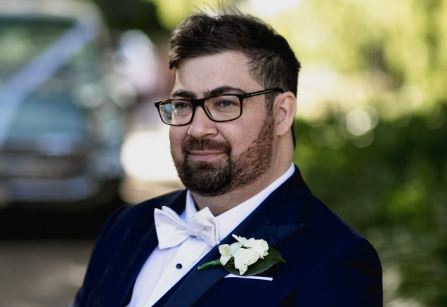Published on November 23, 2021
Toby Dawson (2005) has endured a lot. In 1999 he became a paraplegic just six weeks before starting high school, and in 2016 he was fortunate to have a lifesaving kidney transplant after being on dialysis.

Toby has a passion for helping others succeed, and his resilience, courage, optimism and tenacity have led him to success in the world of aerial imagery.
You graduated in 2005, what have you been doing since leaving school?
I completed a Bachelor of Information Technology at the University of Newcastle whilst working part-time. In 2011 I relocated to Sydney and joined IBM as a Graduate Account Manager working with clients, including Westpac and Qantas. I then managed the IBM Graduate Program, directly managing 50 university graduates.
In 2018 I joined Vocus Communications as an Enterprise Account Manager, and since April this year, I’ve been working as a Strategic Account Manager for an aerial imagery company, Nearmap.
How can aerial maps assist organisations to make better decisions?
Access to high quality, current aerial imagery is crucial to organisations, especially during a pandemic, as employees can access site information remotely. By reducing the need for site visits, it dramatically decreases the costs and risks.
What’s your advice for those who are interested in pursuing a career in aerial imagery?
My advice for those who are interested in any career is to make sure they are passionate about their career choice. It’s very difficult to do a job long term if you’re doing it for the wrong reasons. Try and find something that makes you happy, and you won’t feel like it’s a job.
Don’t be afraid to try something and then change, life is too short to stick to something you don’t enjoy. It’s never too late to start over.
What trait did you learn at school that has helped you succeed, grow and develop?
To take personal responsibility and ownership of your mistakes and successes. There is nothing wrong with making mistakes, so long as you learn from them.
Having real-world job experience is crucial to getting a professional job, not just a degree!
Two of our key values here at HVGS are courage and optimism, can you provide examples of how have you displayed these values throughout your career?
I have displayed courage when I changed jobs and industries. It’s very easy to stay in a job because it’s ‘safe’ and feels ‘comfortable.’
Sometimes you must take a risk and push yourself outside your comfort zone. Twice I have now done this, and it’s paid off for me professionally, personally and financially.
Why do you feel it’s important to live these values?
It’s been very easy over the past two years to feel a lack of optimism.
We live in a world where we have so many opportunities and options for what we study, where we work, where we live. If COVID-19 has taught us anything, it’s shown that the traditional 9-5 job no longer exists or needs to exist.
As we become more digital, we can work in jobs we haven’t seen in the past. I think it’s important to remain optimistic that there is a bright future for us all and the next 20 years is going to be such an exciting time to enter the workforce.
Any other milestones or news you would like to share?
In April 2019, I married my wife, Emma. However, nothing comes close to the birth of my son Leo, born in the final days of 2020, making what was an awful year for everyone, all the better.
